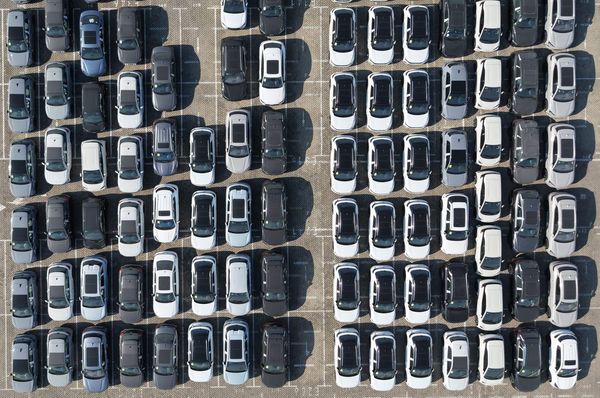
Summary of the day
It has just turned 6pm in Ukraine and Russia. Here are the key events you might have missed from the day:
Russian strikes on Ukraine’s southern Zaporizhzhia region killed three people on Monday, in a second day of deadly attacks on the area, its governor has said. “Three people were killed and three people were wounded in the Pologivskyi district” of Zaporizhzhia, Governor Ivan Federov said on social media.
At least six people have been injured after a Russian missile attack on Monday hit an industrial facility in Ukraine’s southern city, the regional governor has said. He did not provide any details regarding the type of facility. The Guardian is unable to independently verify this account.
Russia has hit up to 80 per cent of Ukraine’s conventional power plants and half its hydroelectric plants in recent weeks, in the heaviest attacks since the war began, Ukrainian energy minister German Galushchenko has said. “Up to 80% of thermal generation was attacked. More than half of hydro generation and a large number of substations,” Galushchenko told journalists in Kyiv. “This is the largest attack on Ukraine’s energy sector” since war began, the minister said, adding that he suspects that Russia has modified their weapons to now use Iranian-style explosive drones and missiles that cause more damage per attack.
The Russian-controlled Zaporizhzhia nuclear power station has just announced that another drone was shot down over the roof of reactor number six, according to Reuters. “Today, a kamikaze drone was shot down over the plant. It fell on the roof of Unit 6,” the plant said, below a picture of reactor No. 6. Reactor No. 6 is now shut down, according to the plant.
The head of the International Atomic Energy Agency (IAEA) has condemned a drone strike on one of six nuclear reactors at the Russian-controlled Zaporizhzhia nuclear power plant in Ukraine. “This cannot happen,” director general Rafael Grossi wrote on a social media post, adding, “No one can conceivably benefit or get any military or political advantage from attacks against nuclear facilities. This is a no go.”
The Kremlin continues to blame Ukraine for the attacks on the Zaporizhzhia nuclear power station, calling them “very dangerous”, but a senior Ukrainian intelligence officer has denied Kyiv’s involvement. The Guardian is unable to independently verify either account.
Russian Foreign Minister Sergei Lavrov arrived in Beijing on Monday to display the strength of ties with close diplomatic ally China, amid Moscow’s war against Ukraine. Despite its backing of Russia in the Ukraine war, China’s foreign ministry spokesperson Mao Ning told reporters Monday that “China has an objective and fair position on the Ukraine issue … We have been actively promoting peace talks and political solutions. China is not a creator or party to the Ukraine crisis, and we have not and will not do anything to profit from it.”
The US Treasury Secretary has threatened sanctions on China’s banks which aid Russia’s military capacity, amid Russia’s diplomatic visit to China. She told reporters, as she wrapped up four days of talks with China, that “any banks that facilitate significant transactions that channel military or dual-use goods to Russia’s defence industrial base expose themselves to the risk of US sanctions.”
The Kremlin has warned that a planned German military presence in Lithuania would escalate tensions. The Nato military alliance and EU member Lithuania, which borders Russia and its ally Belarus, said earlier it would partly finance permanently hosting of 5,000 German troops from 2027.
More than 10,400 homes across Russia have been flooded, triggering record water levels in the Ural mountains, Russia’s emergency ministry have said. “An increase in air temperatures, active snow melt and river openings are predicted,” Russia’s emergency ministry said. “More than 10,400 residential buildings remain flooded in 39 regions.” Russia’s government declared a federal emergency on Sunday over flood-hit areas, state media reported.
Residents of Orsk, the Ural Mountains city most affected by some of Russia’s worst flooding in decades, staged protests against local authorities’ perceived inaction on Monday. “Shame! Shame! Shame!” the crowd of about 100 is heard chanting in a video circulating on Telegram. The chants from the protest are believed to be directed at the local administration over low compensation for property damage and the burst dam’s structural deficiencies, according to reports from the Moscow Times.
A member of the far-right Alternative for Germany (AfD) accused of taking money from a pro-Russian media site has denied any wrongdoing. German magazine Der Spiegel and Czech newspaper Denik N reported that Bystron had received money from the portal Voice of Europe, which was sanctioned by the Czech government late last month due to suspected Russian influence. Petr Bystron, a member of the German parliament and an AfD candidate in European parliament elections set for June, has “vehemently denied” the allegations, an AfD spokesperson told Reuters.
Residents of flood-struck Orsk stage protest against local government
Residents of Orsk, the Ural Mountains city most affected by some of Russia’s worst flooding in decades, staged protests against local authorities’ perceived inaction on Monday.
“Shame! Shame! Shame!” the crowd of around 100 is heard chanting in a video circulating on Telegram.
Much of Orsk is submerged underwater, after the Ural River swelled and burst through a dam on Friday, forcing thousands to evacuate. Russia has declared a regionwide state of emergency and officials have opened a criminal case against the local authorities for “negligence and violation of construction safety rules” over the burst dam.
The chants from the protest are believed to be directed at the local administration over low compensation for property damage and the burst dam’s structural deficiencies, according to reports from the Moscow Times, an English and Russian-language online newspaper.
Updated
US House speaker faces revolt by hard-right Republicans over Ukraine aid package
House speaker Mike Johnson returned to work on Monday facing mounting pressure to advance a Ukraine aid package as well as the threat of an intra-party revolt if he does so.
The Republican speaker has indicated the House will take up the issue of Ukraine funding this week, as the chamber reconvenes after a two-week recess. But many hard-right members of Johnson’s conference remain staunchly opposed to additional Ukraine aid, and one of them has already threatened to oust the speaker, complicating the potential timing of a floor vote.
Ukrainian President Volodymyr Zelenskiy said on Sunday that Kyiv will lose the war against Russia if the US congress does not approve military aid to battle Moscow’s invasion.
Read the latest on this developing story from our correspondent in Washington:
80% of Ukraine’s coal, gas power plants hit by Russian attacks, says minister
Russia has hit up to 80 per cent of Ukraine’s conventional power plants and half its hydroelectric plants in recent weeks, in the heaviest attacks since the war began, Ukrainian energy minister German Galushchenko said on Monday.
“Up to 80% of thermal generation was attacked. More than half of hydro generation and a large number of substations,” Galushchenko told journalists in Kyiv.
“This is the largest attack on Ukraine’s energy sector” since war began, the minister said.
The country’s largest nuclear power station in Zaporizhzhia has been under Russian control since near the start of the war.
Galushchenko said that “the scale and impact of these attacks is much greater” than earlier attacks over the winter from 2022 to 2023 when millions suffered in freezing temperatures without electricity and heating.
“We see that Russians modified the weapons,” the minister said, adding that they now use Iranian-style explosive drones and missiles that cause more damage per attack.
Russian missile hits industrial facility in Ukraine's Zaporizhzhia, governor says
A Russian missile attack on Monday hit an industrial facility in Ukraine’s southern city of injuring at least six people, local authorities said. Ivan Fedorov, the regional governor, did not provide any details regarding the type of facility in his message on the Telegram.
Last Friday, an unidentified industrial facility in the city was struck by a Russian missile strike which also damaged residential buildings and killed four people. It was not clear if Monday’s strike targeted the same site.
Separately, Russian officials accused Ukraine of launching drone strikes against the Zaporizhzhia nuclear power plant, occupied by Moscow troops.
Moscow-installed officials have made a series of claims since last week. Kyiv said it has nothing to do with incidents at the power station reported by Russia and called them “armed provocations”.
Operators at nuclear plant says another drone downed, falls on roof
The Russian-controlled Zaporizhzhia nuclear power station has just announced that another drone was shot down over the roof of reactor number six, according to the Reuters news agency.
“Today, a kamikaze drone was shot down over the plant. It fell on the roof of Unit 6,” the plant said, below a picture of reactor No. 6.
Reactor number six is now shut down, according to the plant.
Updated
Summary of the day so far
The head of the International Atomic Energy Agency (IAEA) has condemned a drone strike on one of six nuclear reactors at the Russian-controlled Zaporizhzhia nuclear power plant in Ukraine. “This cannot happen,” director general Rafael Grossi wrote on a social media post, adding, “No one can conceivably benefit or get any military or political advantage from attacks against nuclear facilities. This is a no go.”
The Kremlin continues to blame Ukraine for the attacks on the Zaporizhzhia nuclear power station, calling them “very dangerous”, but a senior Ukrainian intelligence officer has denied Kyiv’s involvement. The Guardian is unable to independently verify either account.
Russian Foreign Minister Sergei Lavrov arrived in Beijing on Monday to display the strength of ties with close diplomatic ally China, amid Moscow’s war against Ukraine. Despite its backing of Russia in the Ukraine war, China’s foreign ministry spokesperson Mao Ning told reporters Monday that “China has an objective and fair position on the Ukraine issue … We have been actively promoting peace talks and political solutions. China is not a creator or party to the Ukraine crisis, and we have not and will not do anything to profit from it.”
The US Treasury Secretary has threatened sanctions on China’s banks which aid Russia’s military capacity, amid Russia’s diplomatic visit to China. She told reporters, as she wrapped up four days of talks with China, that “any banks that facilitate significant transactions that channel military or dual-use goods to Russia’s defence industrial base expose themselves to the risk of US sanctions.”
The Kremlin has warned that a planned German military presence in Lithuania would escalate tensions. The Nato military alliance and EU member Lithuania, which borders Russia and its ally Belarus, said earlier it would partly finance permanently hosting of 5,000 German troops from 2027.
More than 10,400 homes across Russia have been flooded, triggering record water levels in the Ural mountains, Russia’s emergency ministry have said. “An increase in air temperatures, active snow melt and river openings are predicted,” Russia’s emergency ministry said. “More than 10,400 residential buildings remain flooded in 39 regions.” Russia’s government declared a federal emergency on Sunday over flood-hit areas, state media reported.
A member of the far-right Alternative for Germany (AfD) accused of taking money from a pro-Russian media site has denied any wrongdoing. German magazine Der Spiegel and Czech newspaper Denik N reported that Bystron had received money from the portal Voice of Europe, which was sanctioned by the Czech government late last month due to suspected Russian influence. Petr Bystron, a member of the German parliament and an AfD candidate in European parliament elections set for June, has “vehemently denied” the allegations, an AfD spokesperson told Reuters.
US threatens sanctions for China banks aiding Russia, amid Russian diplomatic visit to Beijing
US Treasury Secretary Janet Yellen said on Monday, after four days of talks with China, that she has warned the country’s banks and exporters of aiding Russia’s military capacity.
Russian Foreign Minister Sergei Lavrov arrived in Beijing earlier on Monday, emphasising the two country’s close diplomatic ties. Russian state news agency TASS reported that the ministers would “discuss the situation in Ukraine.”
Yellen said at a press conference in Beijing,
I stressed that companies, including those in the PRC, must not provide material support for Russia’s war and that they will face significant consequences if they do. And I reinforced that any banks that facilitate significant transactions that channel military or dual-use goods to Russia’s defence industrial base expose themselves to the risk of U.S. sanctions.
Updated
Kremlin blames Ukraine for nuclear power station attack, Kyiv denies involvement
Kremlin spokesperson Dmistry Peskov repeated on Monday Moscow’s assertion that Ukraine was behind the attacks on the Zaporizhzhia nuclear power station, calling them “very dangerous”.
Russia said Ukraine struck the Zaporizhzhia nuclear power station controlled by Russian forces three times on Sunday and demanded the West respond, though Kyiv said it had nothing to do with the attacks.
A senior Ukrainian intelligence official denied Russia’s accusations on Monday. Andrii Yusov, the spokesperson for Ukraine’s military intelligence agency suggested there had been no attack, saying Russian forces routinely fabricate strikes on the Zaporizhzhia Nuclear Power Plant.
However, the strikes on this occasion were confirmed by U.N.’s atomic watchdog agency, though it didn’t attribute responsibility for the attack to either side.
The Guardian is unable to independently verify either account.
The plant has repeatedly been caught in the crossfire since Russia launched its full-scale invasion of Ukraine in February 2022 and seized the facility shortly after.
The six nuclear reactors on site have been shut down for months, but it still needs power and qualified staff to operate crucial cooling systems and other safety features.
Updated
German lawmaker accused of taking Russian cash denies wrongdoing
A member of the far-right Alternative for Germany (AfD) has denied any wrongdoing following a media report alleging that he had received money from a pro-Russian media site, the party said on Monday.
Petr Bystron, a member of the German parliament and an AfD candidate in European Parliament elections set for June, has “vehemently denied” the allegations, an AfD spokesperson told Reuters.
“The party leadership is in favour of a comprehensive investigation and therefore calls on all those who claim to have circumstantial evidence and proof to include it in the investigation,” the spokesperson said.
“At this point in time, the federal leadership (of the party) must assume Mr Bystron’s innocence.”
German magazine Der Spiegel and Czech newspaper Denik N reported that Bystron had received money from the portal Voice of Europe, which was sanctioned by the Czech government late last month due to suspected Russian influence.
The AfD, with 78 of 735 seats in Germany’s parliament, leads polls in several poorer, post-industrial eastern states where its anti-immigrant stance resonates. It opposes Germany’s backing for Ukraine in the war with Russia.
US military presence in Japan impedes any peace treaty with Tokyo, the Kremlin said on Monday.
Japanese Prime Minister Fumio Kishida is due to hold a summit in Washington this week with US President Joe Biden, the first state visit by a Japanese leader in nine years.
Kremlin spokesman Dmitry Peskov told reporters on Monday, “The de facto defence alliance is already there and we know about the United States’ military potential that is stationed in Japan - by the way, close to our borders.”
“This has always been a stumbling block in trying to reach a settlement of our main problem, the peace treaty problem,” he said.
Russia, the main successor state to the Soviet Union, and Japan have never signed a peace treaty formally ending their hostilities during World War Two.
German military presence in Lithuania will escalate tensions, says Kremlin
Kremlin Spokesman Dmitry Peskov said on Monday that a planned German military presence in Lithuania would escalate tensions.
The NATO military alliance and EU member Lithuania, which borders Russia and its ally Belarus, said earlier it would partly finance permanently hosting of 5,000 German troops from 2027.
Updated
Russia's foreign minister visits Beijing, emphasises ties with China
Russian Foreign Minister Sergey Lavrov arrived in Beijing on Monday to display the strength of ties with close diplomatic ally China, amid Moscow’s war against Ukraine.
Russian state news agency TASS said the ministers would “discuss the situation in Ukraine and the Asia-Pacific region, issues of bilateral cooperation and interaction in the international arena,” quoting Russian Foreign Ministry spokesperson Maria Zakharova.
Despite its backing of Russia in the Ukraine war, China’s foreign ministry spokeswoman Mao Ning told reporters Monday that “China has an objective and fair position on the Ukraine issue.”
“We have been actively promoting peace talks and political solutions. China is not a creator or party to the Ukraine crisis, and we have not and will not do anything to profit from it,” Mao told reporters at a daily briefing.
“Relevant countries should not smear and attack the normal state-to-state relations between China and Russia... let alone shift the blame onto China and provoke bloc confrontation,” she added.
US Treasury Secretary Janet Yellen, who is currently wrapping up a visit to China on Monday, said she had warned officials of the consequences of supporting Russia’s military procurement.
Updated
'This cannot happen': atomic watchdog chief condemns Zaporizhzhia nuclear plant attack
The head of the International Atomic Energy Agency (IAEA), Rafael Mariano Grossi, has condemned a drone strike on one of six nuclear reactors at the Russian-controlled Zaporizhzhia Nuclear Power Plant in Ukraine.
“This cannot happen,” Grossi wrote on a social media post. Adding, “No one can conceivably benefit or get any military or political advantage from attacks against nuclear facilities. This is a no go.”
Today, for the first time since Nov 2022 & after I set out 5 basic principles to avoid a serious nuclear accident w/ radiological consequences,@IAEAorg’s #ISAMZ confirmed that at least 3 direct hits against ZNPP main reactor containment structures took place. This cannot happen.
— Rafael MarianoGrossi (@rafaelmgrossi) April 7, 2024
Russia has blamed Ukriane for the strike, but Ukrainian intelligence sources have denied any involvement. The Guardian is unable to independently verify either account.
IAEA officials on site reported in a statement that “outside a laboratory, they saw blood stains next to a damaged military logistics vehicle, indicating at least one casualty.”
“This is a major escalation of the nuclear safety and security dangers,” director general Grossi said. “Such reckless attacks significantly increase the risk of a major nuclear accident and must cease immediately.”
While the team so far has not observed any structural damage to systems, structures, and components important to nuclear safety or security of the plant, Grossi warned of the dangers of such strikes on Sunday, saying, “Although the damage at unit 6 has not compromised nuclear safety, this was a serious incident that had the potential to undermine the integrity of the reactor’s containment system.”
Updated
More than 10,400 homes across Russia have been flooded, triggering record water levels in the Ural mountains, Russia’s emergency ministry said on Monday.
“An increase in air temperatures, active snow melt and river openings are predicted,” Russia’s emergency ministry said. “More than 10,400 residential buildings remain flooded in 39 regions.”
The Ural River several metres in just hours on Friday due to melting water, bursting through a dam embankment in the city of Orsk, 1,800 km (1,100 miles) east of Moscow.
Russia’s government declared a federal emergency on Sunday over flood-hit areas, state media reported.
Here are the latest photos coming through the wires:
Opening summary
Hello and welcome to our continuing live coverage of Russia’s war on Ukraine.
Russian strikes on Ukraine’s southern Zaporizhzhia region has killed three people on Monday, in a second day of deadly attacks on the area, its governor said.
“Three people were killed and three people were wounded in the Pologivskyi district” of Zaporizhzhia, Governor Ivan Federov said on social media.
In other key developments over the weekend:
Russia claimed on Sunday that Kyiv had attacked the Moscow-occupied Zaporizhzhia nuclear power plant with a drone, but Ukraine has denied being behind the attack. An intelligence official said Kyiv had nothing to do with any strikes on the station and suggested they were the work of Russians themselves. The Guardian has been unable to independently verify either account.
-
UN Nuclear watchdog urges restraint after Ukraine attacked the Zaporizhzhia nuclear plant on Sunday. The International Atomic Energy Agency (IAEA) was informed on Sunday by authorities at the Zaporizhzhia nuclear power plant that a drone detonated on site today. “Such detonation is consistent with IAEA observations,” the nuclear watchdog said in a post on a social media. IAEA director general, Rafael Mariano Grossi, also said of the attack, “I urge to refrain from actions that … jeopardise nuclear safety.”
Earlier, the administration reported an Ukrainian strike on the dome of the plant’s sixth power unit that caused no damage, and an attack that damaged a truck parked near the station’s canteen, according to Russian state news agency TASS reports.
Russia has been accused of systematically using illegal chemical gas attacks against Ukrainian soldiers. Ukrainian troops claimed that they have been subjected to “almost daily” attacks from small drones dropping teargas and other chemicals. The use of such substances, which is known as CS, is banned during wartime under the Chemical Weapons Convention.
Russian foreign minister Sergei Lavrov will make an official visit to China to discuss war in Ukraine. Talks scheduled on Monday and Tuesday between Russia and China will consist of bilateral cooperation as well as “hot topics”, such as the crisis in Ukraine and the Asia-Pacific, the Russian foreign ministry has said. On Saturday, the US warned allies that China has provided geospatial intelligence to Moscow in its war against Ukraine. According to reports, China has provided Russia with satellite imagery for military purposes, as well as microelectronics and machine tools for tanks.
Three civilians were killed in a Russian attack on the frontline village of Guliaipole, in Ukraine’s southeastern Zaporizhzhia region, according to reports from the regional government. The Guardian could not independently verify these claims.
One civilian was killed and four others were injured after Ukrainian drones were intercepted in Belgorod. A woman was killed and four more people were wounded after air defences downed Ukrainian drones on the approach to Russia’s Belgorod city, according to a statement from the local governor posted on Telegram.
Ukrainian President Volodymyr Zelenskiy has said that Kyiv will lose the war against Russia if the US congress does not approve military aid to battle Moscow’s invasion. Republicans in Congress have been blocking tens of billions of dollars in military assistance for Kyiv for months.
The Russian government has declared a federal emergency over record floods in the Orenburg region. The floods, caused by rising water levels in the Ural River, forced over 4,000 people to evacuate, and has flooded more than 10,400, according to state media. Flooding in two more nearby regions has been deemed “inevitable” by the Kremlin. Russian authorities have opened a criminal case for “negligence and violation of construction safety rules” over the burst dam. The Orenburg regional governor said specialists assessed that the dam was built “for a different weight” and that the level of rainfall was “exceptional”.
Updated







